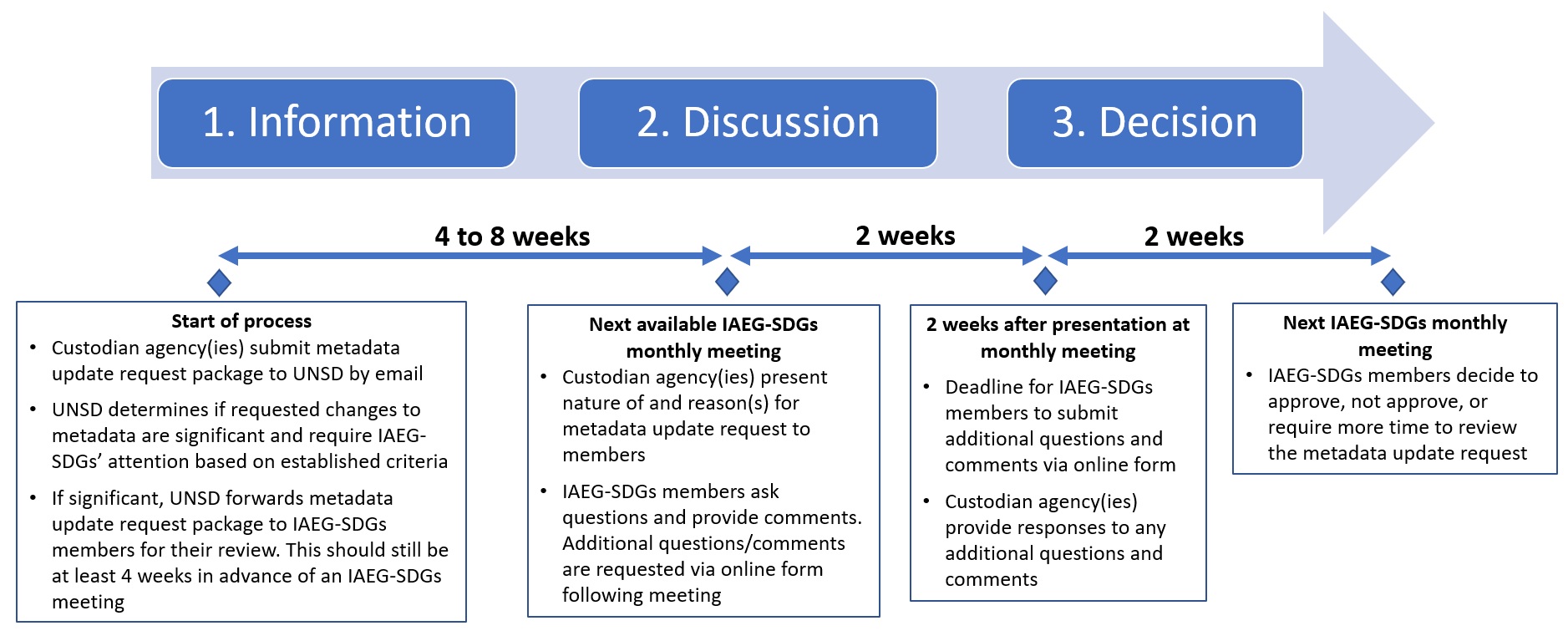SDG Indicators
Metadata repository
The metadata available in this repository is a work in progress. It reflects the latest reference metadata information provided by the UN System and other international organizations on data and statistics for the Tier I and II indicators in the global indicator framework. This repository will be further updated and periodically reviewed in cooperation with the respective data compilers.
In addition:
- Official list of Global Sustainable Development Goal indicators
- Tier Classification for Global SDG Indicators
- Previous Work Plans for Tier III Indicators (archive)
- Metadata for initially proposed indicators (archive)
Metadata update process:
Methodology for indicators is expected to update from time to time. For any metadata updates that include significant changes (detailed in the form below), the IAEG-SDGs will review the changes during its member meetings based on the update request form (see below) and track change metadata provided. Custodian agencies will also be invited to attend an upcoming IAEG-SDG member meeting to present on the proposed changes and answer any questions.
As requested by the IAEG-SDGs, custodian agencies must provide their metadata update request documents at least one month in advance of their next scheduled meeting to allow for sufficient time for review. Depending on the time of submission and the next IAEG-SDG member meeting, the timeline for review and approval can span up to 12 weeks or more. Therefore, it is important to provide submissions as soon as they are available. Please note that no data are published in the Global SDG Indicators Database until the corresponding metadata is approved by the IAEG-SDGs.
Please see below the projected stages and timeline.
To get started, custodian agencies are requested to:
- Download the metadata Word file for the indicator from the metadata repository (below) and edit the Word file in track changes to show the requested changes.
- Custodian agency downloads and completes the “Metadata update request form” (below) and sends the request package to sdgindicators@un.org.
Search
Goal 14. Conserve and sustainably use the oceans, seas and marine resources for sustainable development
Target 14.1: By 2025, prevent and significantly reduce marine pollution of all kinds, in particular from land-based activities, including marine debris and nutrient pollution
Target 14.2: By 2020, sustainably manage and protect marine and coastal ecosystems to avoid significant adverse impacts, including by strengthening their resilience, and take action for their restoration in order to achieve healthy and productive oceans
- Indicator 14.2.1: Number of countries using ecosystem-based approaches to managing marine areas
Target 14.3: Minimize and address the impacts of ocean acidification, including through enhanced scientific cooperation at all levels
- Indicator 14.3.1: Average marine acidity (pH) measured at agreed suite of representative sampling stations
Target 14.4: By 2020, effectively regulate harvesting and end overfishing, illegal, unreported and unregulated fishing and destructive fishing practices and implement science-based management plans, in order to restore fish stocks in the shortest time feasible, at least to levels that can produce maximum sustainable yield as determined by their biological characteristics
Target 14.5: By 2020, conserve at least 10 per cent of coastal and marine areas, consistent with national and international law and based on the best available scientific information
Target 14.6: By 2020, prohibit certain forms of fisheries subsidies which contribute to overcapacity and overfishing, eliminate subsidies that contribute to illegal, unreported and unregulated fishing and refrain from introducing new such subsidies, recognizing that appropriate and effective special and differential treatment for developing and least developed countries should be an integral part of the World Trade Organization fisheries subsidies negotiation4
- Indicator 14.6.1: Degree of implementation of international instruments aiming to combat illegal, unreported and unregulated fishing
Target 14.7: By 2030, increase the economic benefits to small island developing States and least developed countries from the sustainable use of marine resources, including through sustainable management of fisheries, aquaculture and tourism
- Indicator 14.7.1: Sustainable fisheries as a proportion of GDP in small island developing States, least developed countries and all countries
Target 14.a: Increase scientific knowledge, develop research capacity and transfer marine technology, taking into account the Intergovernmental Oceanographic Commission Criteria and Guidelines on the Transfer of Marine Technology, in order to improve ocean health and to enhance the contribution of marine biodiversity to the development of developing countries, in particular small island developing States and least developed countries
- Indicator 14.a.1: Proportion of total research budget allocated to research in the field of marine technology
Target 14.b: Provide access for small-scale artisanal fishers to marine resources and markets
- Indicator 14.b.1: Degree of application of a legal/regulatory/ policy/institutional framework which recognizes and protects access rights for small-scale fisheries
Target 14.c: Enhance the conservation and sustainable use of oceans and their resources by implementing international law as reflected in the United Nations Convention on the Law of the Sea, which provides the legal framework for the conservation and sustainable use of oceans and their resources, as recalled in paragraph 158 of “The future we want”
- Indicator 14.c.1: Number of countries making progress in ratifying, accepting and implementing through legal, policy and institutional frameworks, ocean-related instruments that implement international law, as reflected in the United Nations Convention on the Law of the Sea, for the conservation and sustainable use of the oceans and their resources
